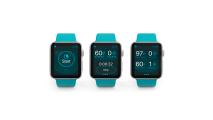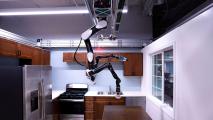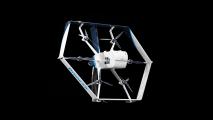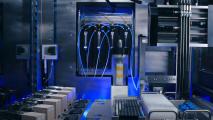
Artificial Intelligence
Rapid advancements in AI today have the potential to change everything about everything. But will they? We’re exploring what will change, how, and whether we’re building digital gods or stochastic parrots.
More
At-home breast cancer screening, powered by AI
An award-winning at-home breast cancer screening device, called the Blue Box, could one day replace uncomfortable mammograms.
Google’s Tree Canopy Lab is helping LA cool down
Google’s new Tree Canopy Lab uses AI and aerial photography to combat the urban heat island effect by showing a city exactly where it could use more trees.
Stopping nightmare disorder with a prescription-only watch
A prescription-only watch that treats nightmare disorder is the latest in a growing subset of health technologies called prescription digital therapeutics.
Human battles AI fighter jet in first man vs. machine test flight
Daniel Robinson, a veteran F-22 pilot, flew a real aircraft and battled an AI virtual fighter in a world’s first.
Cough-analyzing AI detects asymptomatic COVID-19 infections
MIT has developed an AI that can detect asymptomatic COVID-19 infections from the sound of a person’s forced-cough with incredible accuracy.
Deepfakes shine in South Park creators’ new show
The creators of South Park have released a web show, Sassy Justice, that makes use of incredibly realistic deepfakes.
If you train robots like dogs, they learn faster
The dog-inspired SPOT framework effectively trains an AI robot more quickly than other reinforcement learning methods.
Bringing lost languages back to life with AI
An algorithm that can identify the closest living relatives of lost languages could help linguists unlock the meaning of ancient texts.
Robot lawyer helps people connect with incarcerated loved ones
DoNotPay’s robot lawyer can now help people write and send letters to inmates without worrying about violating a facility’s mail rules.
Robot cook could help restaurants recover from COVID-19
Miso Robotics is making Flippy ROAR available for $30,000 in the hopes the robot cook will help the restaurant industry recover from the pandemic.
Waymo's driverless car service opens to the public
Waymo One has relaunched, and this time, all users can ride in cars without safety drivers.
Toyota unveils Spiderman-like home cleaning robot
Toyota built a cleaning robot that descends from a kitchen’s ceiling as an example of the kind of tech that might one day support Earth’s aging population.
New VR movie lets you play god to a planet of AIs
In the new VR movie “Agence,” artificially intelligent characters respond to the actions of the viewer in unpredictable ways.
Minecraft’s urban planning AI could help design future cities
AIs design entire settlements in an annual Minecraft competition that could reveal uses for the tech in real-world urban planning.
Google built a neural network to warn ships of whales. will it help?
Google introduced an artificial neural network that can locate whales in the ocean. They want to use it to keep the animals safe from ships.
Meet the Mayflower, the robot boat crossing the Atlantic in 2021
The new Mayflower, set to traverse the Atlantic in 2021, won’t bear any pilgrims. It’s a robot boat, sailing sailor-free.
Underwater robots may be the future of deep sea mining
Tech requires raw material, and some lays at the bottom of the sea. Could underwater robots be the future of deep sea mining?
AI that predicts pregnancy complication could save lives
By predicting future preeclampsia risk, the AI might save the lives of mothers and their babies.
Amazon drone delivery gets approval to launch from FAA
Prime Air, Amazon’s drone delivery service, has secured a key FAA certification, clearing it for the next phase of testing in the U.S.
Robots are running COVID-19 drug development
IBM’s new online platform, RoboRXN, combines artificial intelligence, cloud computing, and robotics to automate the COVID-19 drug development process.
Get inspired with the most innovative stories shaping the world around us.























